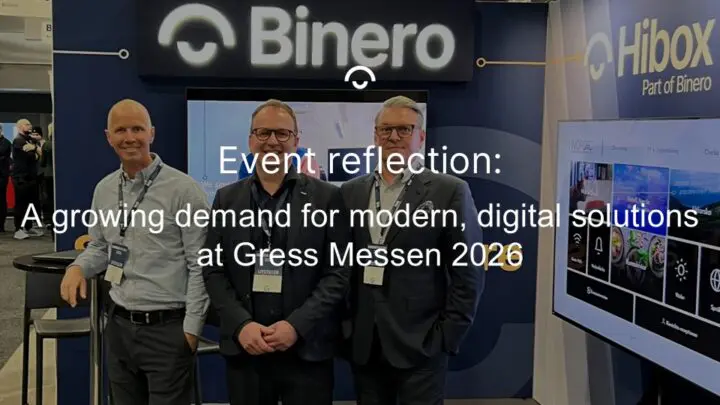Is colocation an advantage in the event of IT attacks?
Colocation is not just a good way to place your hardware in another operator's data centre. If you choose the right colocation provider, you can save money, get better protection against IT attacks and increase the performance of your platform. It also gives you and your employees more opportunity to focus on your core business. Colocation is not for everyone; sometimes it can be advantageous to keep parts of your environment in-house or move directly to a Swedish cloud service.
Use our price calculator to calculate what your consumption would cost in a Swedish cloud service.
Although colocation is not the solution to all challenges, when done right, it offers many valuable benefits that are not always obvious. It is a great option for companies that need access to specialised facilities or expertise, want to outsource the management of their IT infrastructure, or are starting their journey to the cloud!
The advantages of colocation include:
- Reduced cost
- Improved performance
- Increased operational reliability
- Greater flexibility
- Increased security
- More available time
- Depending on the supplier, significantly reduced risk
Below are some areas where colocation can contribute to your IT strategy.
Will our IT environment withstand hackers switching to AI?
How does operating entirely on your own affect the level of security, as opposed to collaborating with a colocation provider?
It goes without saying that the quality of IT security varies between different companies' platforms. But as a colocation provider, we would like to highlight some of the security benefits of using colocation from a provider that puts IT security first!
Managing a large-scale environment with many simultaneous users provides access to valuable information about the security situation on the internet and the threats that may be encountered in real time. If the provider offers an IDS/IPS solution, traffic is analysed, patterns are identified (preferably through AI/ML – manual filtering has long been insufficient) and hackers are quickly blocked for all of the provider's customers, including colocation.
These systems are complex, costly and require a great deal of knowledge. But in return, they are easy to share, as they primarily deal with information: who is hacking and how are they doing it? If you know this (and have a good way of filtering based on the information), you can thwart attacks before they reach more than one customer (or even before the first customer, as certain information is also available to subscribe to).
If you rent space (whether colocation or cloud capacity) from a provider that benefits from this considerable asset, you gain significant security advantages. Economies of scale enable stronger and more up-to-date protection against attacks.
As a colocation customer at Binero, you get access to market-leading DDoS protection as well as our IDS/IPS and anti-scanning solution, meaning that you are protected against the majority of attacks before they even reach your infrastructure. If you are not a customer of ours, we recommend that you check with your current provider to find out how they deal with today's threats.
One alternative may be to rent DDoS protection from your internet service provider, which normally costs a considerable amount of money. Furthermore, this protection is rarely always on (but is based on so-called ‘on ramp’ technology, where traffic is routed to the protection in the event of an obvious problem) and therefore has much poorer accuracy. >Today, 95% of all DDoS attacks are based on methods other than traffic overload and are also constantly changing. To counter these, you need protection that is always on and uses AI or ML to analyse traffic in real time.
Based on the above, we can ask ourselves the question:
Is it still advantageous to operate your IT environment entirely in-house?
Does maintaining your own infrastructure operations and operations department contribute to your business or distract from your core business? Below are some examples of the costs associated with in-house operations:
- Staff, 24/7 (even on public holidays)
- Premises rental
- Diesel generators
- UPSs
- Internet service providers
- DDOS protection and IDS/IPS (and expertise)
- Firewalls (and the expertise to set them up correctly)
- Infrastructure monitoring system
- Hardware maintenance and support contracts
- Internal expertise in all hardware, as well as the cost of renewing it.
- Redundancy and, where relevant, geographical redundancy, minimum for backups
Calculate how much colocation at Binero would cost you
External factors that may affect your operational reliability
It has not escaped anyone's attention that external factors in our environment affect us in our everyday lives, but also our digital business.
Today, southern Sweden is particularly vulnerable, as access to electricity can no longer be taken for granted. There is a risk of being disconnected from the grid for certain hours of the day. If you have not already invested in a redundant power supply (i.e. diesel generators and UPSs – with maintenance agreements and fuel on call), there is a real risk of downtime.
In addition to electricity, your internet service provider is also an external factor where redundancy is not a given. Internet service providers can provide redundant connections, but unless you have explicitly purchased such a service, you should not expect your internet connection to be up and running 24/7, 365 days a year. An internet service provider may also have internal problems that cause even a redundant solution from a single provider to go down. This could be due to fibre optic cables or peering between different providers malfunctioning and isolating a single provider.
At Binero, we handle this by balancing our traffic across four different internet service providers.
Use colocation when moving to the cloud
Why not use your existing platform as a springboard to the cloud? Most people find it difficult to make a complete move from a system that has not been written off to a cloud solution. Building in parallel therefore becomes difficult. Others do not want to move all their infrastructure to the cloud – a strategy that has proven successful for many. Let your needs and opportunities guide you!
We already have a public cloud service in place under the same roof in the data centre, which makes a future move to the cloud extra easy. Scale up and down as you wish and pay by the hour – you'll probably be surprised at how affordable it is! Connect your existing environment to our cloud and switch over seamlessly when you decide it's time to retire your old hardware – or utilise available capacity when you need to grow quickly!
Read more about colocation at binero and our Swedish public cloud service


